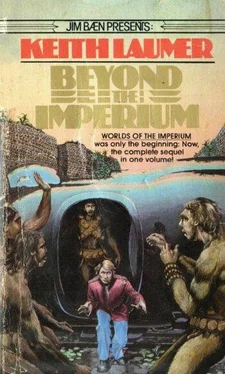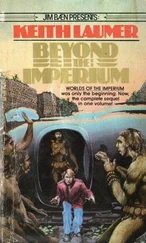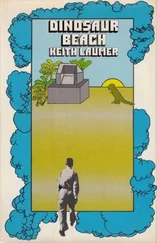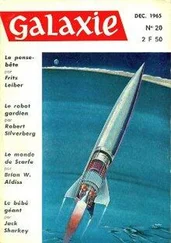I forgot all about the slug gun. I went through the door at a run, launched myself at the figure from whom heat radiated like a tangible wall and saw it turn with unbelievable, split-second speed, throw up a hand—five glowing fingers outspread—take one darting step back—
Long, pink sparks crackled from the outflung hand, leaping toward me. Like a diver hanging suspended in midair, I saw the harsh electric glare, heard the pop I as the miniature lightnings closed with me…
Then a silent explosion turned the world to blinding white, hurling me into nothingness.
For a long time I lay, clinging to the dim and formless dream that was my refuge from the hazy memory of smouldering footprints, a deserted room, and a fantastic glowing man crouched over his victim. I groaned, groped for the dream again, found only hard, cold concrete against my face, a roiling nausea in the pit of my stomach, and a taste like copper pennies in my mouth. I found the floor, pushed hard to get my face up out of the grit, blinked gummed eyes…
The room was dark, silent, dusty and vacant as a robbed grave. I used an old tennis shoe someone had left in my mouth as a tongue, grated it across dry lips, made the kind of effort that under other circumstances had won luckier souls the Congressional Medal, and sat up. There was a ringing in my head like the echo of the Liberty Bell just before it cracked.
I maneuvered to hands and knees, and, taking it by easy stages, got to my feet. I sniffed. The burning odor was gone. And my quarry hadn’t waited around to see whether I was all right. He—or it—had been gone for some time—and had taken the corpse with him.
The light in the room was too weak to show me any detail. I fumbled, got out a massive flint and steel Imperium-style lighter, made three tries, got a smoky yellow flame and squinted to find the trail of blackened prints that would show me which way the fiery man had gone.
There weren’t any.
I went all the way to the door, looking for the scars I had seen earlier, then came back, cast about among empty cardboard cartons and stacked floor wax drums. There were no footprints—not even the old-fashioned kind—except for mine. The dust was thick, undisturbed. There were no marks to show where the body had lain, not a trace of my wild charge across the room. Only the scrabble marks I had made getting to my feet proved that I wasn’t dreaming my own existence. I had heard of people who pinched themselves to see if they were dreaming. It had always seemed a little silly to me—you could dream a pinch as well as any other, more soothing, sensation. But I solemnly took a fold of skin on the back of my hand, squeezed hard. I could hardly feel it.
That didn’t seem to prove anything one way or another. I made it to the door like a man walking to the undertaker’s to save that last cab fare, and went into the hall. The lights were out. Only a dim, phosphorescent glow seemed to emanate from the walls and floor. The sight of the wood planking gave me no comfort at all. The prints burned here had been dark, distinct, charred. Now the dull varnish gleamed at me, unmarked.
The buzzing in my head had diminished to a faint hum, like that of a trapped fly, as I pushed through the door into the ground floor hallway. The milk glass globe hanging from the high ceiling glared at me with an unhealthy electric blue. A blackish haze seemed to hang in the still air of the silent corridor, lending a funereal tinge to the familiar vista of marble floor and varnished doors. Behind me, the door clicked shut with a shockingly loud, metallic clatter. I took a few breaths of the blackish air, failed to detect any hint of smoke. A glance at the door showed me what I had expected—smooth dark brown paint, unmarked by burning handprints.
I crossed the hall, pushed into an empty office. On the desk, a small clay pot sat on a blotter, filled with hard, baked-looking dirt. One dry leaf lay on the desk beside it. The desk clock said twelve-oh-five. I reached past it, picked up the phone, jiggled the hook. The silence at the other end was like a concrete wall. I jiggled some more, failed to evoke so much as a crackle of line static. I left the room, tried the next office with the same result. The phones were as dead as my hopes of living to a ripe old age outside a padded cell.
My footsteps in the corridor had a loud, clattering quality. I made it to the front entrance, pushed out through the heavy door, stood on the top step looking down at my car, still sitting where I had left it. The two escort vehicles were gone. Beyond the car, I noticed that the guard shack at the gate was dark. The street lamps seemed to be off too, and the usual gay pattern of the lights of the city’s towers was missing. But a power failure wouldn’t affect the carbide pole lights… My glance went on to the sky; it was black, overcast. Even the stars were in on the black out.
I got into the car, turned the switch and pressed the starter button on the floor. Nothing happened. I muttered an impolite suggestion, tried again. No action. The horn didn’t work either, and twisting the light switch produced nothing but a dry snick!
I got out of the car, stood undecided for a moment, then started around the building for the garages in the rear. I slowed, halted before I got there. They were dark, the heavy doors closed and barred. I fetched up another sigh, and for the first time noticed the dead, stale smell of the air. I walked back along the drive, passed the guard post, unaccountably deserted, emerged onto the street. It stretched into shadows, silent and dark. Predictably, there were no cabs in sight. A few cars stood at the curb. I started off toward the bridge, noticed a dark shape halfway across it: a car, without lights, parked midway in the span. For some reason, the sight shocked me. A small, uneasy feeling began to supplant the irritated frustration that had been gathering strength somewhere down below my third shirt button. I walked along to the car, peered in through the rolled up windows. There was no one inside. I thought of pushing the car to the side of the street, then considered the state of my constitution at the moment and went on.
There were more abandoned cars in Gustav Adolfstorg, all parked incongruously in midstream. One was a boxy, open touring car. The ignition switch was on, and the light switch too. I went on, checked the next one I came to. The switches were on. It appeared that there had been an epidemic of automotive ignition trouble in the city tonight, as well as a breakdown in the power plants—a coincidence that did nothing to improve my spirits.
I walked on across the square with its heroic equestrian statue, past the dark front of the Opera House, crossed Arsenalsgatan, turned up Tradgarsgatan, walked past shuttered shops, bleak in an eerie light like that of an eclipse. The city was absolutely still.
No breeze stirred the lifeless air, no growl of auto engines disturbed the silence, no clatter of feet, no distant chatter of voices. My first faint sense of uneasiness was rapidly developing into a full-scale cold sweat.
I cut across the corner of the park, skirting the glass display cases crowded with provincial handicrafts, and hurried across a stretch of barren clay.
The wrongness of it penetrated my preoccupation. I looked back across the expanse of sterile earth, searching on across the garden—the oddly naked garden. There were the gravelled paths, the tile lined pools—their fountaining jets lifeless—the band shell, the green painted benches, the steel lampposts with their attached refuse containers and neatly framed tram schedules. But not one blade of grass, not a tree or flowering shrub—no sign of the magnificent bed of prize rhododendron that had occupied a popular magazine’s rotogravure section only a week earlier. I turned and started on, half-running now, the unease turning to an undefined dread that caught at my throat and surged in my stomach like foul water in a foundering galley’s bilge.
Читать дальше












